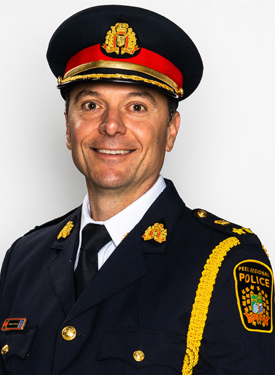
Features
Q&A
Q&A: Peel Regional Police Deputy Chief Anthony Odoardi
September 30, 2021 By Brieanna Charlebois
 Peel Regional Police Deputy Chief Anthony Odoardi
Credit: PRP
Peel Regional Police Deputy Chief Anthony Odoardi
Credit: PRP In a recent Blue Line, The Podcast, Peel Regional Police Deputy Chief Anthony Odoardi, chair of the OACP-led Next Generation-911 Inter-Agency Advisory Panel, joined editor Brieanna Charlebois to discuss what NG-911 means for the frontlines, how agencies can optimize the technology and what to consider as they ready themselves for change.
Q: For those who may not be familiar with NG-911, can you explain what exactly it is why it’s important?
Next generation-911 is a mandatory replacement from the federal government through the CRTC for all existing 911 infrastructure, systems and procedures across the entire nation.
The current 911 system is reaching the end of its life and it can’t keep up with existing technologies. So, the expectation is to modernize the system but it’s not only about new technology. It’s going to impact so many other things, including wellness of the community members who utilize the system, call-takers who answer the calls and our first responders, who attend to them. Earlier this year, the CRTC mandated timelines. The timeline to accept initial calls will be March 2022 and there’s a new deadline for public safety answering points to decommission the existing 911 by March 2025.
NG-911 is going to be an enhancement. It will provide greater security for people in crisis and for people in emergency situations. That said, there are some things we need to prepare for to understand the system and then it’ll be about good communication with our communities about how to effectively implement them.
Q: How should provincial agencies and governments be thinking about this?
Part of my role for my Ontario Association of Chiefs of Police (OACP) NG-911 committee is to be a facilitator for many different organizations. My role is to supply the government with recommendations from subject matter experts and explain what it is we need to see and address as we transition over to the new system. More specifically, we’ve determined and asked governing bodies to consider three main aspects: governance, funding and education. These are key to moving forward in the process.
Q: What can agencies do to fully optimize the technology?
So, just for some background, the current system works as follows: the secondary Public Safety Answering Point (PSAP) receives information from the primary PSAP, which is the agency that receives the 911 call from the public. So, in order for the next Generation-911 to work properly, the government has determined, going forward, there will be no difference between primary and secondary PSAPs. That’s the main difference from today’s system. Basically, all the PSAPs have to come together—and there’s quite a few of them within Ontario and certainly quite a few across the nation—and decide whether or not to combine services, offer the same services, determine whether they should situated at the same geographical location, and how to consolidate it effectively. All these systems have to be looked at. This is the biggest game changer of NG-911: the interoperability piece. What I mean by that is the 911 system was always meant to be interoperable and able to transfer data to and from various places. NG-911 wants to capitalize on that more effectively and efficiently, which will require PSAPs work together. An example of this is real-time texting. A whole lot of interoperability has to happen with the cooperation of all public safety agencies coming together to understand how and why they want this to roll out, so we can do it successfully.
Q: As the world becomes more technologically rich, there is an increased accountability regarding data in police possession and how law enforcement officers use it. What opportunities, risks and/or considerations does this present for emergency service providers?
In the current geo-political landscape, security of data has never been more intense—and rightfully so. We need to treat people’s private information, including some of the information that may come over the NG-911 system, with the upmost respect and security; not use it for any other purpose than to provide safety to our communities. One stream that we don’t often look at when we speak about emergency services is ensuring there is an ethical and transparent way to transmit data, then use it for emergency services.
Community engagement in filling the NG-911 dossier is going to be needed so the public can understand what happens to their data. There’s also a necessity for PSAPs to receive this data from the community. The onus is on us to disseminate information to the appropriate public service agency—whether that’s police, fire, ambulance—and to critically, reliably and cyber-securely deliver it so the frontline members so they can respond accordingly.
Editor’s Note: This episode of Blue Line Podcast was sponsored by Deloitte. The interview has been condensed and edited for clarity. To listen to the full episode, visit blueline.ca/podcasts.
Print this page